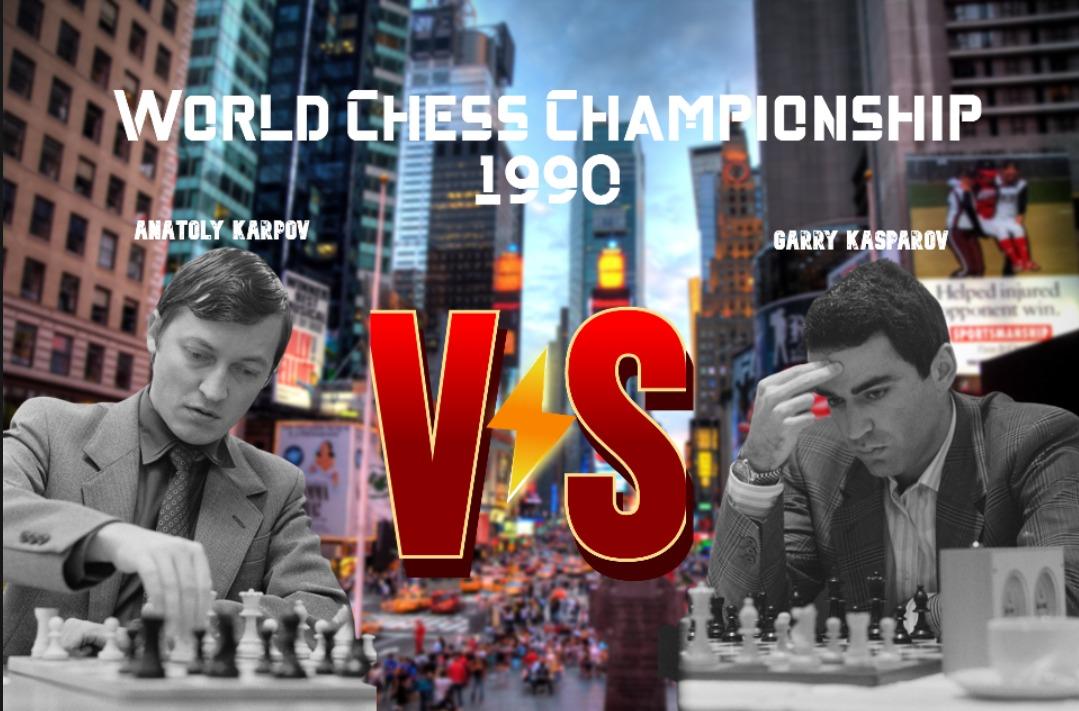
Karpov's Chess Legacy - Does Karpov Have a Chance To Return?
Hello everyone, and welcome to my blog - Karpov's Chess Legacy!
First of all, I want to thank chess.com for giving me the title of Top Blogger! I am happy to share with you, dear readers, my passion for chess history and chess strategy.
In today's episode, we would discuss the 1990 World Chess Championship, played by Karpov, the challenger, and the World Champion Kasparov. This blog also includes a special surprise! Let's get right into it - What was the format?
The Format
This time, the 2 long-time rivals met in Lyon and New York for their match. 24 games were played, and the one who first reached 12½ - won. In case of a tie - the world champion would win.

As you can see - the stakes are high, and so is the time control. We are set to look at the games, but before that - the special surprise I promised!
Interview With Kasparov
Yes, you read that right. After the match, Kasparov had many things to tell the source of this interview.
In this first part of the interview, Kasparov talks about the preparations for the match and the events that were happening prior.
It is well known that the basis of your successes is deep and thorough preparation for each important event. For this new encounter with your 'perpetual' opponent, you must have begun preparing long before the match.
"since this was already our fifth match, it could have been expected that the preparatory work done by both players would be of the highest quality. Nevertheless, Karpov was able to prepare better. Why? Because before the match itself, he had to pass through a severe selection process. Playing three Candidates matches is a good form of training". (In the 90s, the candidates weren't as they are now - they consisted of big qualifiers, quarterfinals and semifinals, and a final match for the opportunity to play the world champion).

You have in mind the January events in Baku (Wikipedia - Black January was a massacre by the Soviet Red Army and the KGB secret police of peaceful Azerbaijani protesters), as a result of which you were forced to flee from your native town. Did you nevertheless succeed in carrying out fully your intended preparation plans for the match?
"To say that the preparation was not carried out fully would be an understatement. The sort of preparation that I am accustomed to seeing was altogether absent. Usually, I reckon that a hundred days of work were necessary. This time, I barely managed to scrape together 60 days of preparation. There was neither sufficient time nor reserves of nervous energy."
In such a match, psychological stresses are inevitable. Over a period of three months of very difficult struggle, you had to endure a number of unpleasant moments, and experience doubts and disappointments. How did you succeed in relieving these stresses?
All this, of course, had to be endured. Doubts? One can never avoid those. After the first 6 games, there began a difficult period for me, one which could have turned any player into a state of panic (The score after 6 games was 3.5-2.5 in Kasparov's favor, but Kasparov drew games from winning positions). Fortunately, there were also many positive emotions. I relieved the tension by walking in parks, playing some tennis, and running.

The Match Begins
For the 5th time, the 2 men sat down to play yet another match for the most wanted title in chess. As we can understand from Kasparov's interview, his preparation was lacking, so he had to find a way to score against a well-prepared opponent. After the first game (which is usually a "testing game" for the players) ended in a draw, Kasparov got to play white in game 2. Let's see how that game went.
A great display of strategy and tactics combined by Kasparov, who took the lead after this game. Karpov on the other hand took a short timeout (which he could, according to the rules of the match) to restore his energy and prepare better for the next games.

Karpov Strikes Again
And better prepared he was! For a couple of games, Karpov held Kasparov's offensive attempts and gained some confidence. Kasparov on the other hand got nervous, as he couldn't capitalize on his advantages on the board. Those psychological trends continued until game 7 when the audience got to see why Karpov was the challenger for the 4th time in a row.
